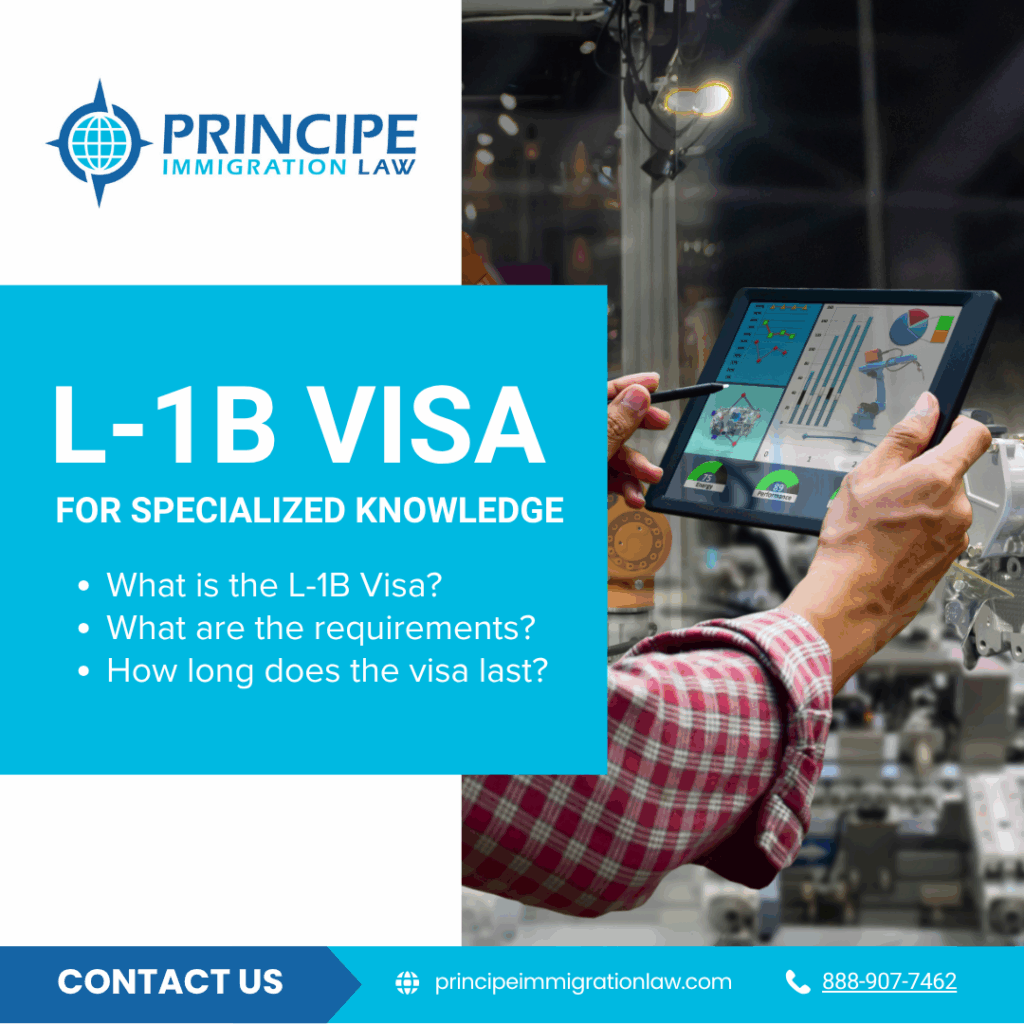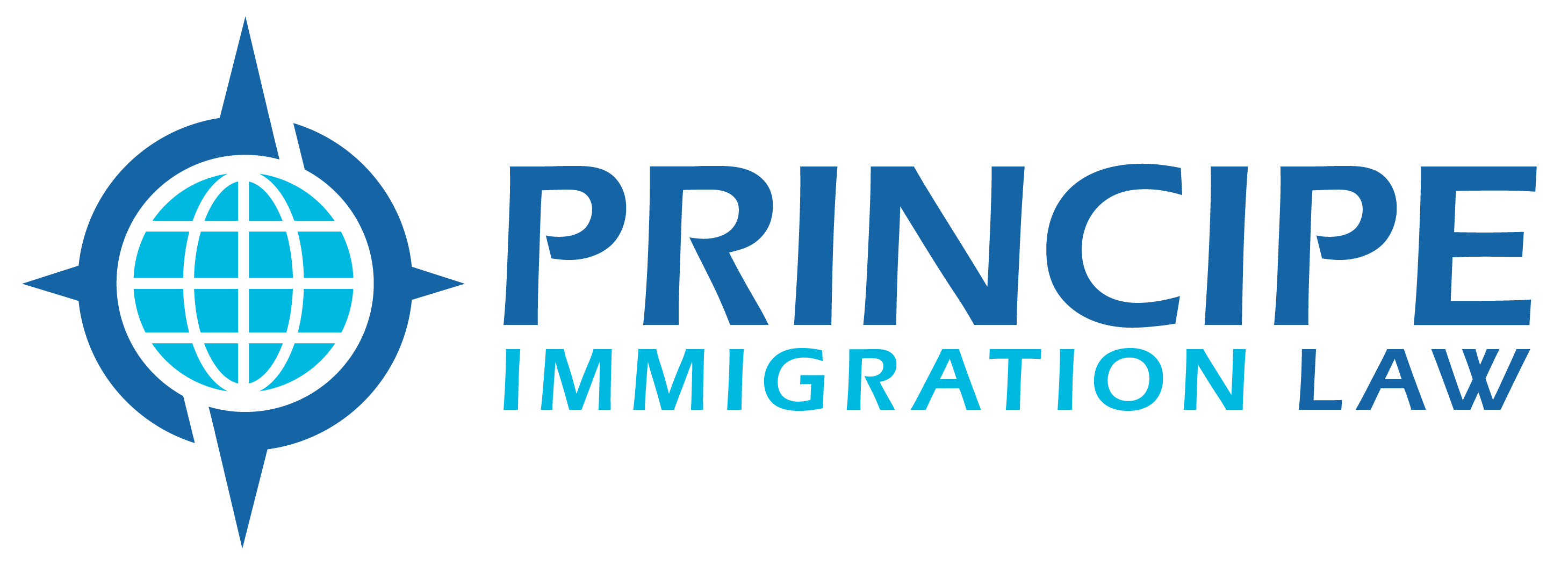U.S. Opportunities for Intracompany Transferees with Specialized Knowledge: The L-1B Visa Classification
The L-1B visa provides a streamlined pathway for companies to transfer employees with specialized knowledge from their international offices to the United States. This visa category is designed for intra-company transfers that bring valuable expertise to U.S. operations.
To qualify for a L-1B visa, both the company and the employee must meet specific requirements. Here is what U.S. Citizenship and Immigration Services (USCIS) looks for:
About the L-1B Visa: A Pathway for “Specialized Knowledge” Workers
For companies expanding into the U.S. market or strengthening their U.S. operations, one of the biggest challenges is finding the right talent. This is where Principe Immigration Law helps clients fill this gap with L-1B visas. The L-1B visa classification is designed for employees who bring “specialized knowledge”: special or advanced knowledge of a company’s products, services, or processes and procedures that is not readily available in the U.S. workforce. These employees are often the key to ensuring that business operations in the United States reflect the same quality, standards, and innovation that make the company successful abroad. Think of roles such as:- Software engineers who developed and maintain a proprietary platform and can ensure its smooth rollout in the U.S.
- Product designers who understand unique features that set a company’s offerings apart from competitors.
- Technical experts on racing teams who work with cutting-edge specialized equipment and performance systems.
- Researchers or analysts who bring insights from a company’s global projects that have not been introduced in the U.S.
- L-1A Visa – for executives and managers who will be leading or managing U.S. operations and/or personnel. (You can learn more about this option in my earlier post: From L-1A Visa to Green Card: Strategic Immigration Options for Executives & Managers).
- L-1B Visa – for employees who will work in the U.S. in a specialized knowledge capacity. (See 8 CFR 214.2(l)(1)(ii)(D) for the regulatory definition).
 What Are the Requirements for the L-1B Visa?
What Are the Requirements for the L-1B Visa?
To qualify for a L-1B visa, both the company and the employee must meet specific requirements. Here is what U.S. Citizenship and Immigration Services (USCIS) looks for:
- Qualifying Relationship Between Companies: The U.S. and foreign entities must have a qualifying relationship either as parent, branch, affiliate, or subsidiary. This relationship requires common majority ownership or control by the same persons or entities.
- The U.S. Company Must Be “Doing Business”: The U.S. entity must be engaged in the regular, systematic, and continuous provision of goods or services. Simply registering an office in the United States is not enough to meet the requirement. There must be real, ongoing business activity.
- Qualifying Employment Abroad: The employee must have worked for the foreign entity for at least one continuous year within the past three years before filing the L-1B petition.
- Specialized Knowledge Role: The employee’s role in the foreign entity must have involved specialized knowledge of the company’s products, services, procedures, or techniques. The employee must be transferring to the U.S. company to work in a position that requires specialized knowledge.
What is Specialized Knowledge?
The concept of specialized knowledge is the foundation of the L-1B visa classification. It is what sets this visa option apart from L-1A visas for executives and managers. Under the Code of Federal Regulations [8 CFR §214.2(l)(1)(ii)(D)], specialized knowledge is defined as: “…special knowledge possessed by an individual of the petitioning organization’s product, service, research, equipment, techniques, management, or other interests and its application in international markets, or an advanced level of knowledge or expertise in the organization’s processes and procedures.” (Emphasis added). USCIS relies on dictionary definitions of “special” and “advanced” as well as the agency’s practice and policy guidance when deciding if an employee qualifies because the statute and regulations do not define the terms. According to USCIS Policy Manual [https://www.uscis.gov/policy-manual/volume-2-part-l-chapter-6], specialized knowledge workers must possess:- Special knowledge, which is knowledge of the petitioning organization’s product, service, research, equipment, techniques, management, or other interests and its application in international markets that is distinct or uncommon in comparison to that generally found in the industry; or
- Advanced knowledge or expertise, which is knowledge of or expertise in the petitioning organization’s specific processes and procedures that is not commonly found in the relevant industry and is greatly developed or further along in progress, complexity, and understanding than that generally found within the employer.” See Chapter 4, Specialized Knowledge Professionals (L-1B) [2 USCIS-PM L.4].
How Long Does the Visa Last?
The L-1B visa is a nonimmigrant visa, it is temporary in nature and does not directly lead to a green card like the L-1A visa category that can segue to an EB1-C. The EB1-C is an employment-based Green Card category for multinational managers and executives who are transferred from a qualifying foreign company to a U.S. affiliate, parent, or subsidiary to work in a managerial or executive role. For workers who will be coming to the United States to set up a new office, the L-1B visa is initially granted for a period of 1 year. For workers coming to work for existing offices, the L-1B visa is initially granted for a period of 3 years. The L-1B visa can be extended in 2-year increments, for a total period of stay of 5 years.What About Family Members?
Spouses and unmarried children who are under 21 years of age may accompany the transferring employee or later seek admission to the U.S. with an L-2 visa. They are generally granted the same period of stay as the L-1B employee. L-2 spouses are considered employment authorized automatically when they enter the U.S. in L-2S status; minor children can attend school in the U.S., but they do not have work authorization.FAQs
What are The Benefits of a L-1B Visa?
For Employers:- Transfer skilled employees with specialized knowledge from foreign offices to U.S. parent companies, subsidiaries, affiliates, or branch offices
- Establish new U.S. offices by transferring key personnel with specialized expertise
- Maintain business continuity across international operations
- Opportunity to work in the United States while leveraging specialized skills
- Career advancement within the same organizational structure
- Path to contribute expertise to U.S. business expansion
- There is no annual limit or cap like H-1Bs
- L-1A classification allows for dual intent and potential path to permanent residency
- Family members can accompany the L-1B employee
What are The Limitations of a L-1B Visa?
- They are employer-specific to the Petitioning Company. The employee cannot change employers as an L-1B worker
- There is a only a five-year maximum period of stay
- L-1B specialized knowledge petitions have come under intense scrutiny by USCIS, and may be subject to a Request for Evidence by USCIS challenging the specialized knowledge capacity
A Success Story:
Overcoming a Complex L-1B RFE for Specialized Engineering Expertise
Principe Immigration Law successfully guided a multinational corporate client through a challenging Request for Evidence (RFE) for a commissioning engineer critical to executing final commissioning and after-sales service for the company’s automotive and industrial test systems serving U.S. customers.The Challenge
USCIS questioned whether the employee possessed the “specialized knowledge” required for L-1B classification, requiring comprehensive documentation of the engineer’s advanced knowledge and expertise.Our Strategic Approach
We demonstrated the employee’s “advanced knowledge” of the Petitioner’s processes and procedures by:- Documenting Critical Project Leadership: we submitted evidence of the employee’s essential role in a multimillion-dollar project for a major Asian customer
- Highlighting Specialized Training: we detailed the employee’s advanced expertise with proprietary test cell control systems that extended well beyond routine engineering skills
- Demonstrating Unique Value: we showcased the employee’s bespoke work experience with the petitioner’s internal methodologies and specialized procedures
